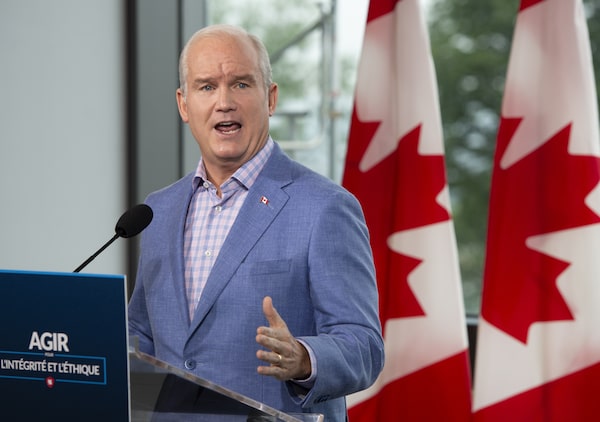
Conservative Leader Erin O'Toole is zeroing in on the housing crisis, pledging to build a million homes in three years and raise barriers to foreign investors.Ryan Remiorz/The Canadian Press
While it’s early days, one subject that could emerge as a defining issue in the current federal election campaign is housing. And the federal Conservatives may be best poised to capitalize on one of the true hot button topics in the country.
It could be particularly beneficial for the party in key areas such as Toronto and Vancouver, where affordable housing remains as intractable a problem as ever. And where feelings continue to run high over what to do about it.
The Liberals have yet to release their election platform and have yet to make housing a key talking point in the campaign. However, the past federal budget included a commitment to spend $2.5-billion over 10 years to create 35,000 affordable housing units. Around the thorny issue of foreign ownership, the party is mulling a meagre one-per-cent tax on non-resident foreign owners.
The NDP are proposing 30-year terms on mortgages insured by Canada Mortgage and Housing Corp. They’ve pledged to build a half million homes they are calling affordable but without specifics – over 10 years. The party is also proposing a 20-per-cent tax on houses purchased by foreign buyers.
Of the three main parties, it is the Conservatives with the most ambitious housing plan – something of a surprise given that this is an area usually owned by the big-spending Liberals and the grandiose-promising NDP.
Conservative Leader Erin O’Toole officially announced his party’s housing plan on Thursday, highlighting new seven-to-10-year mortgages to provide stability for first-time buyers and lenders. The Conservative platform features a promise to build a million homes over three years.
The party would also adjust the mortgage stress test that many feel discriminates against small-business owners and non-permanent employees. Given the expansion of the gig economy, this could be an attractive feature for young voters.
There is plenty more in their plan too.
But perhaps the Tories’ most courageous pledge is to ban foreigners not living in or moving to Canada from buying homes. This ban would apply for two years after which it would be reappraised. A Conservative government would, however, encourage foreign investment in affordable, purpose-built rental housing.
I call the proposed sanction brave because the subject remains politically fraught, especially in Metro Vancouver. Anyone who pointed to foreign buyers as the main driver of the market frenzy between 2015 and 2017 was accused of being a racist, despite the evidence that this group was indeed a driver of the unconscionable price escalation we witnessed.
The matter became the subject of a lawsuit that recently concluded in the B.C. Court of Appeal. Chinese national Jing Li, who is a temporary resident of Canada, said that the B.C. government’s foreign-buyers tax promoted “prejudice, stereotyping or disadvantages on Chinese people.”
Justice Barbara Fisher, writing for the three-judge panel in a unanimous decision, said the tax was a legitimate policy instrument designed to address the fact that “foreign nationals significantly contributed to the escalation of prices in housing,” in Metro Vancouver.
Most of the cries to do something about foreign ownership in the Canadian housing market have been ignored, despite the fact it remains a non-controversial policy edict in many other countries. That includes China, which has erected near impenetrable roadblocks to foreign ownership.
Here in Canada, however, politicians have mostly been careful to dance around the issue as delicately as possible for fear of offending someone who might one day be a voter they need.
Blocking foreign ownership is not going end the housing crisis in Canada. Let’s be clear about that. It’s going to take a suite of measures, akin to what the Tories are proposing. Even then, it’s not likely to be solved entirely. That ship has sailed.
But young people hoping to one day get into the market shouldn’t have to watch their dreams disappear because foreign investors need a place to park their money. Many neighbourhoods, especially on the west side of Vancouver, still show signs of the earlier housing frenzy, with many homes bought as investments still sitting empty.
I’ve never understood why it would be considered controversial to take action that prevents this type of activity. To institute policies that tipped the scales in favour of people who actually live in Canada, and pay taxes here. I think the federal Liberals fear being called xenophobic, and are putting that worry ahead of the legitimate frustrations of Canadians who want nothing more than to have a place to call their own.
There is lots more that our politicians can be doing, like stopping speculation by both foreign investors and Canadians looking for an opportunity to make some easy money. When you have a housing crisis, as we do, speculation shouldn’t be allowed.
Housing is the most pressing issue facing many Canadians. Right now, the federal Conservatives have the best plan for dealing with it.
 Gary Mason
Gary Mason